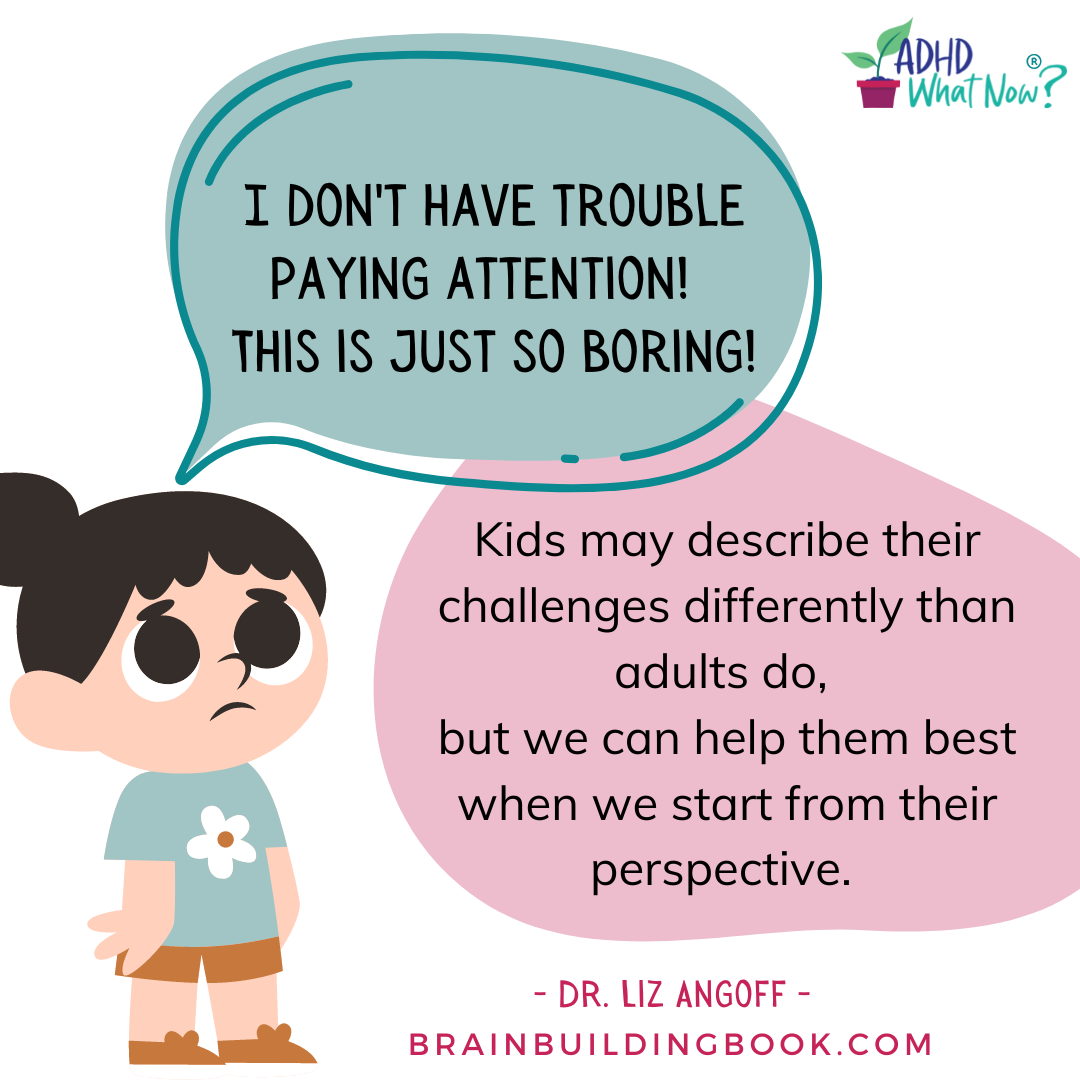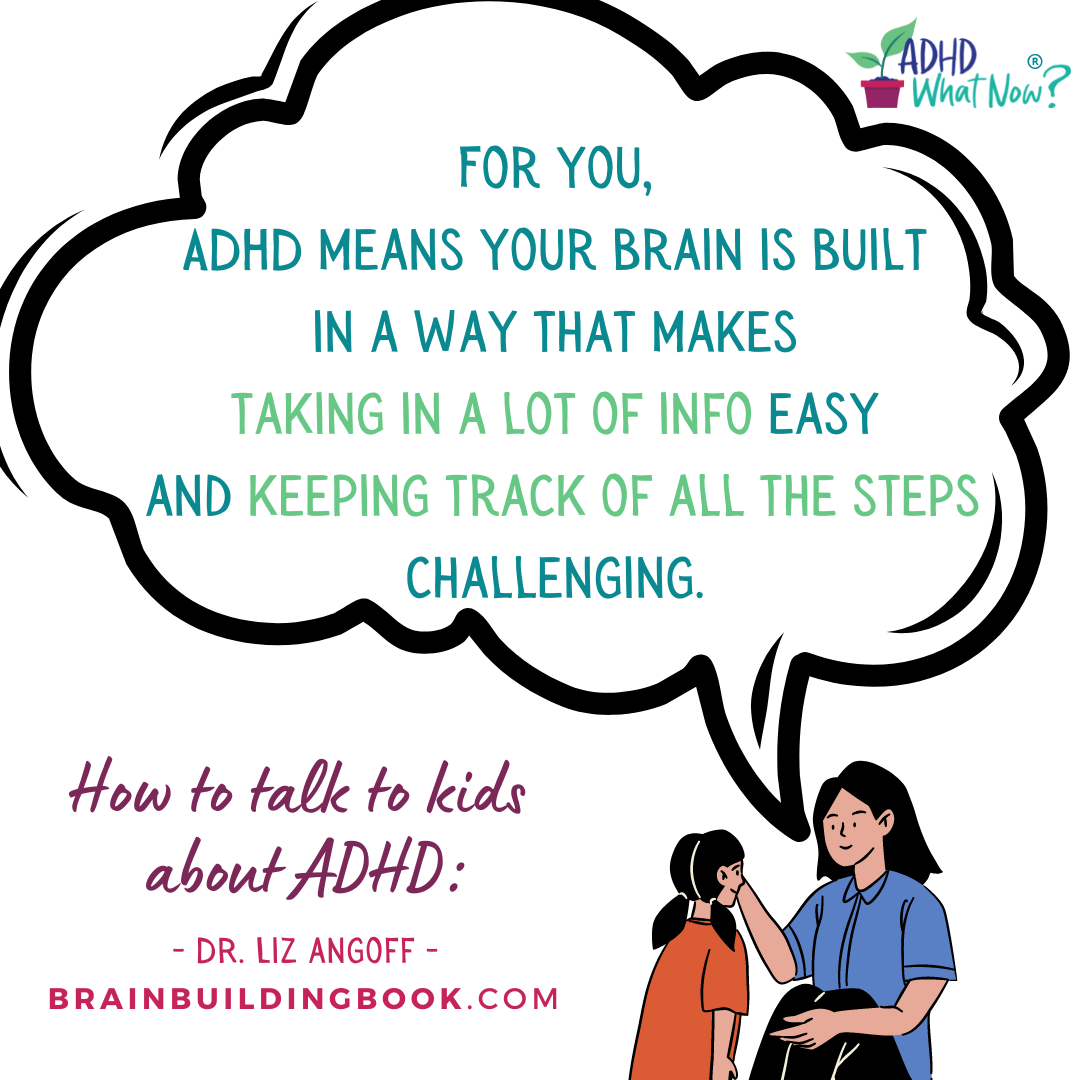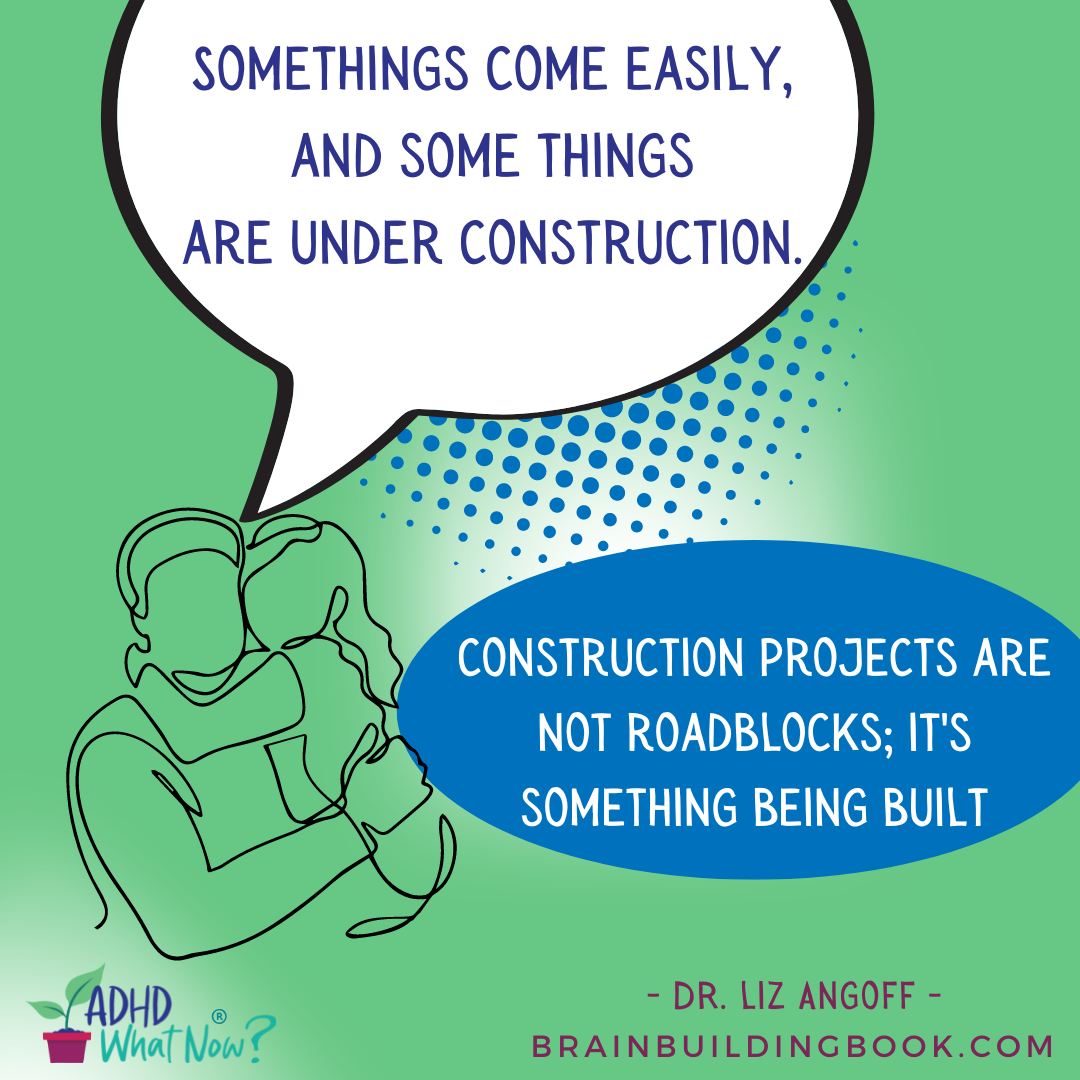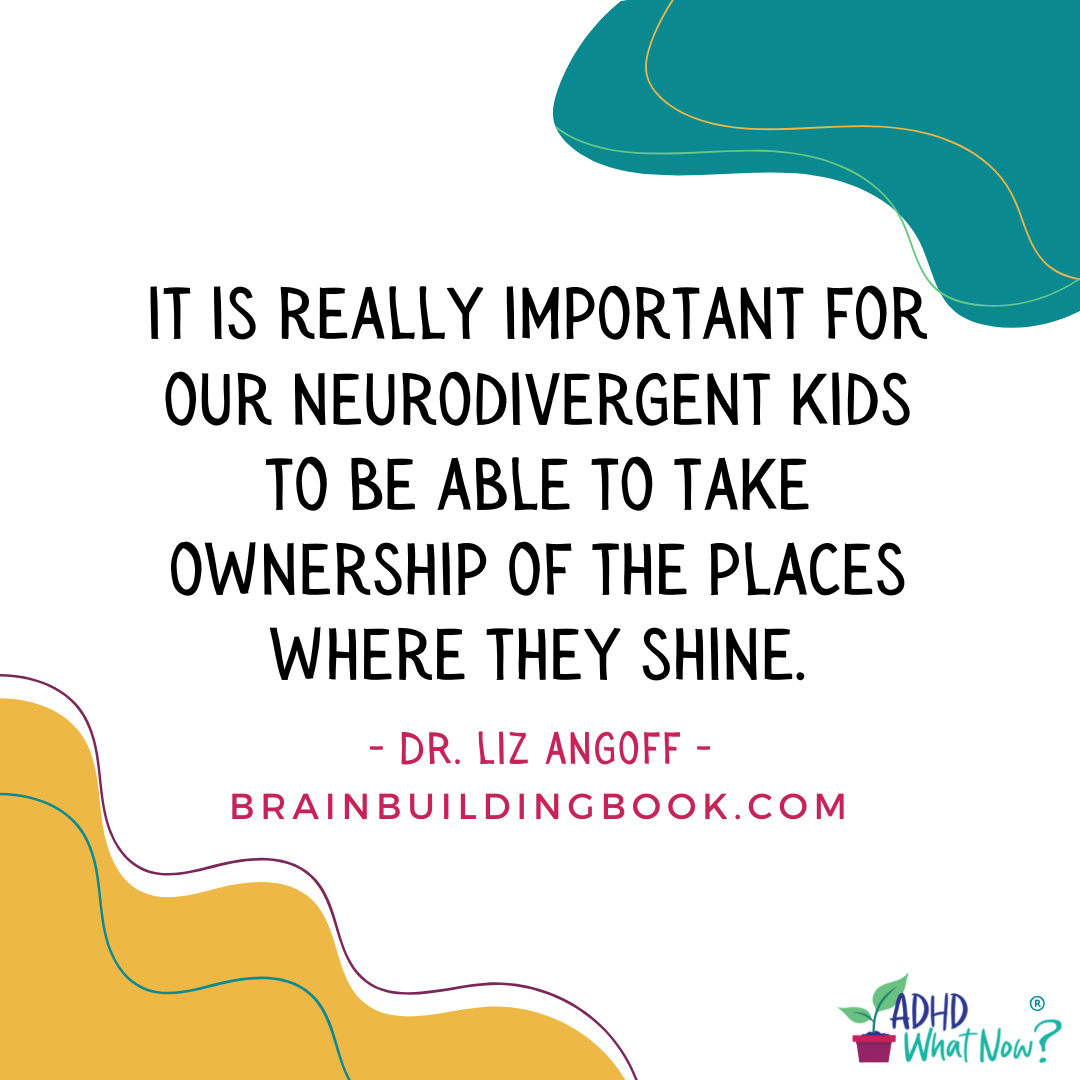How to Talk to Your Child About ADHD to Reduce Stigma and Increase Possibilities
Mar 21, 2023Talking to kids about their ADHD in a positive and empowering way is essential for creating a successful narrative that will help them thrive as they get older. Dr. Liz Angoff has developed a framework for helping parents and kids work through this conversation by emphasizing positive language, highlighting strengths, and finding solutions. Metaphors can effectively explain ADHD to children and cultivating a growth mindset within these conversations is key. Additionally, she has some awesome free resources that can help you plan these difficult conversations with your kiddos. All of these strategies are valuable in helping kids feel visible and understood and helping parents create a safe space for their children to navigate their learning differences.
LINKS
Dr. Angoff's Website: https://brainbuildingbook.com/
Resources: https://brainbuildingbook.com/parents/
SHAREABLE GRAPHICS





FULL TRANSCRIPT
Veronica: Have you ever wondered how do you speak to your child about ADHD in a way that leaves them feeling positive about themselves and empowered as a person? And this is such an important area for parents and such a common question that I've come across.
I'm so excited to bring to you Dr. Liz Angoff, who I think has such great value to add to this conversation and great resources that she will share with you as to where you can find those at the end.
My name's Veronica Hunter, the founder of ADHD - What Now? and let's dive right into this so important question for parents and for kids. So welcome Dr. Liz. And I know that this is an area of passion. Can you share why, how did it become an area for you?
Dr. Angoff: Yeah, absolutely. So I used to work in the school district for many years where we never talked to kids really about their testing results.
We gave them services, but we didn't really make this connection. And when I went into private practice, parents started to ask, "Hey, this was so illuminating for me to understand my child. Can you explain it to them?"
But I talked to colleagues and nobody had a framework for how to do this and nobody was really, you know, or they would say, you know, like, oh, well I just had a meeting with a kid and you know, it pretty much goes over their head.
And I had, the first time I really tried to talk to a kid about their testing results, like we prepared him, he came in and I started in and he put his head down, started crying and then hightailed it out of the room and went into the car. And I thought, "God, I did all the things." I had a metaphor, I used positive language. I mean I did all the things that are recommended and something went awry.
I thought maybe, you know, and his parents were very forgiving and they said, well, you know, he just wasn't ready. He just wasn't in a good mood, but you know, we need to do better. And I put it to the side.
But then I started working with a lot of adults and adults would come into my office and I'd say, okay, well tell me a little bit about your history and what you know about your learning differences about the way that your brain is wired.
And they would say, I don't know, I was just kind of a bad student. I was a dumb kid, I just hated school. My teachers hated me. And then we would go through the testing and we would start to really rewrite their entire narrative from their childhood as we went through.
And it's like, look, like when you're doing this, like all these, you're thinking about this in so many different ways. This is called divergent thinking. This is actually a quality of ADHD that's really common and it's coming out in the testing. And they're like, "oh, that's part of my diagnosis? Like, that's part of it? I thought it was just all this stuff that's not working."
And by the end of it they're like, "I had no idea. I thought I was broken. I thought I was dumb. I didn't realize that I was misunderstood. I didn't realize that I was just wired differently. I was understanding things differently. I needed something different. I didn't need to be different."
And it clicked for me that these narratives are starting so early in kids, they know something's different. They know something's awry, but they don't know the reason why. And when we don't help them create that narrative, they start to create their own. And those narratives are often very negative and harmful.
And so we need to find a way to start talking to kids early and keep the conversation going so that we hit it often to help redirect that narrative to the positive, empowering. I'm different and that's okay. Not only is it okay, but it's awesome.
Veronica: Absolutely. So that's what I love is that you took this part and you really got into such the practical aspect that people can use because it's such a common question for every parent, right? It's the first question that people often ask is they want to do that for their kiddo they just don't have the language to do so. So in rewriting a kiddo's experience, do you have an example that can kind, that demonstrates how you frame it and the language that you use can be so more so empowering?
Dr. Angoff: Absolutely. I mean just hitting on the language piece, like that's the piece, right? I mean there are a lot of articles that are out there and if you search, like talk to my kid about their disability, or talk to my kid about ADHD, there's a lot of theory out there like be positive or focus on strengths, but it doesn't tell you what to say.
And there are metaphors out there, but a lot of families will say like, but that's not quite my kid. Like it's a helpful but my kid's not presenting in the traditional way. Or they have multiple things going on. Or that's not where they're at right now. Or things changed, you know, and it just needs to be really personalized.
So a lot of the work that I've done and what's been really helpful for me as a practitioner, is honing in on specific language that I can use that's going to be flexible enough to use with every kid and adaptable over time.
And the kind of way that I go about that to personalize it for kids is starting with a problem that they want to solve. And sometimes that looks a lot different than what adults think of.
So we might see a kid like, man, it's so hard for you to pay attention, but what does a kid say? A kid doesn't - I mean some kids might say it's hard for me to pay attention, but a lot of times they'll say it's boring or I don't get to do what I wanna do. Right? Or they might say something that's their perspective on things is really different. And when we start with something that's important to them, it gets them really interested in the conversations.
Like, "you know how you were saying that class feels boring sometimes? I learned some stuff about why can I share that with you? Can I tell you about what I learned?" And by starting with something that's meaningful for them, "you know how I'm always nagging you about homework and we're like clashing every night? That's not working for us, is it? I learned some stuff about why we keep getting into that pattern. Can I share with you what I learned?"
And setting it up that way is so helpful because it makes it meaningful to the child. It's not blaming and it's asking their permission, are you ready to hear some things? And it gives them agency in the conversation. And then from there we get to share what their strengths are and validate what's hard for them.
And the metaphor that I love to use is a construction metaphor. So we start with their highways, your brain is always making different connections and you can think about the fast connections as the highways in your brain. These are the things that come easily or the things that you've practiced so much that you can do them without thinking.
And then there's the things that are under construction. And under construction is such an important framing because it's not a roadblock, it's not a weakness, it's something you are building.
Sometimes construction projects go smoothly, sometimes they take a long time. Sometimes we're waiting for new materials or new skills to come in right before we can do it. There's so many ways to build on it and it's such a familiar framing for kids cuz they've all seen construction underway.
And so thinking of your brain in that way that it's just like, oh this part's under construction and is in process and these are things that are coming more easily to me. And all those things go together and then we can bring that together to say this is what ADHD means for you. This pattern of highways and construction projects that you have is really common.
A lot of people have something similar and we have a name for it. It's so common, we have a name for it and it's a super helpful name. It's called ADHD. And it turns out that there are so many people in the world, creative people, entrepreneurs, people who have made a difference in the world, people who are in your family, people who are in your class that also have really similar brains. And this is what it means for you. For you, ADHD means you've got your highways, you have your construction projects and we're gonna work together to help you be the best person that you can be.
Veronica: I love it because that language makes it so easy and accessible for me as a parent too, right? It's not the metaphor works for for me, not just for the kids.
So what language do you have then if you help to kind of lay this pathway with this language, what do you recommend for people as they're going like in everyday life over a long term? Because this isn't just a one time conversation, it's language that can be incorporated into your daily living with your kid. So what does that sound like a little bit?
Dr. Angoff: That's awesome, Veronica. Like I love that 'cause I think that that's what's been awesome about having this kind of everyday language and the metaphor is that it can be really integrated and I do it with my own child.
I have a young child and we talk a lot about like, you've really built a highway in that skill. Like he's learning how to ride his bike and like remember when you couldn't ride your bike, you didn't have a pathway yet. Like I just saw your brain made a new connection today, like you made a new road and we can celebrate that. Or like, oh wow, like you didn't have to practice that. It seems like that's a natural highway for you.
And then we have the things that like for my child, writing is really hard, you know, and he sees his friends who are starting to be able to draw people and like make things and he's not quite there yet. And we can say like, oh this road's under construction and that's okay, right?
And then we can kind of see, you know, when as he's making progress, like, wow, like I can see the construction happening, like, you built something new today. I see it starting. And it helps put that in that positive framing or even acknowledge when he's really frustrated like, yeah, it feels like this is, a new one for us and we're gonna help you. We'll figure it out. It's gonna be okay.
And then I can also model that as a parent. Like, ooh, this is a construction project for me. You know, we gotta figure out ways for me like, oh I forgot your lunchbox again, that's one of my construction projects. Like, can we think of ways that we can help me build that road? Let's brainstorm that together.
So it's a way that we can talk about it with the whole family so that it's kind of integrated into our daily and we don't have to bring up ADHD and kind of pound our kids on the head with it every day. Like, oh this is your ADHD or this is - it's not about that. It's about understanding your brain, understanding how you work and what makes you unique.
And so having a way to integrate it into the daily conversation with strengths and new construction makes it more kind of normalized that these things are part of our daily experience no matter what we call our brain.
Veronica: And such a great metaphor to incorporate growth mindset into just everyday living as well in a simple and easy way. What about, as you were talking, and what about the idea of comparisons?
Because so you brought up how like your son is comparing to other kids his age. So how do you help specifically address this issue of comparisons for them? Or can you dig into that a little more?
It's a natural tendency, right, to draw comparisons. So, for example, I use this phrase all the time with my kids, correct me if it's wrong. It's just like each person has different areas, I've said strengths and weaknesses, but I'm gonna modify it to like highways and construction zones, right? So we all have highways and we all have construction zones.
And so I guess my question is, I think that's true and at the same time how do you acknowledge that it is, it can just be the sensitive to the different experience that's it is actually acknowledging that it is harder for them, right? They're seeing a difference, they're sensing something different. They're seeing areas where perhaps, you know, writing is more difficult for them. How do you kind of address that complexity?
Dr. Angoff: Yeah, I think I tend to be very transparent and practical with kids and I think that most of the kids that I work with actually find it really validating in a relief to hear like, oh yeah, this is something you're working on and that's okay, we're helping you.
And so I don't think we need to be afraid of what kids notice. Like you notice that that for, you know, for your friend it looks like like writing comes more easily to them or like, yeah, this, this one is harder for you than other kids and that's okay, that's why we're working with Ms. Smith. You know, or like, oh, let's brainstorm some ways to kind of help you with that.
Or even taking a step back and saying like, oh that's, that's a really interesting observation. Do you wanna talk about ways that we could help you with that? Or did you just wanna share it with me?
It can be hard, you know, when you see that other kids are doing things that, that you're not doing yet and that's the big growth mindset word, right? Like 'yet'. Or that that other kids seem to have completed a construction project that you're still working on.
And I think that it's also really important to point out when we see things like, like, wow, that came easily to you. It doesn't come easily to everybody. And that's neat that you have that highway and to help them own their strengths as well.
Because a lot of times kids who have challenges that I don't think they have a lot of opportunity to really own their strengths and their uniqueness, especially if that exists outside of the school context, which takes up so much of our kids' life and brain space that this is something that is really a natural skill for you or something you've worked really hard to build and you know, maybe it can be something that you share with your, your friends or ways that we can set you up as a leader in that regard. So you have opportunities to teach others, to mentor for others to be the expert.
Yeah. Sorry, just that coming up as I'm talking, I think so often in intervention we're setting up opportunities for kids to have opportunities to be experts, which is a really important thing for our neurodivergent kids to be able to really take ownership of the places where they do shine.
Veronica: So beautiful. And I love that you also have, and I want people to know, as they're listening to you, that you have practical tools to help people incorporate this and develop this. So can you share a little bit about what they are, where people can find them? And then I have one last question for you, if it's okay afterwards.
Dr. Angoff: Yeah. So you can find all of my tools on brainbuildingbook.com/parents and I have a lot of things there.
So one tool that's been really helpful for parents is how to talk to kids about the testing process. And it's a handout that I sent to everybody who comes to me for assessment and psychologists all over the world are using as a way to just give parents some language to tell kids like, "Hey, you're gonna go work with this person, let me tell you what it's all about". And using that growth mindset language.
I also, if you're on the other side and you're wondering like, okay, my child has a diagnosis, how do I talk to them? I actually have a script that's new on the website that is, you can fill in the blank and actually use it as a little script for talking to your kid the first time you have this conversation.
And I have blog posts that walk you through how to talk to kids about ADHD, specifically, autism, dyslexia, emotional regulation, all kinds of different neurodivergent profiles. And I'm hoping that that language again is just really helpful to you and other members of your family for keeping that consistent, positive language and lots more stuff up there. So it's brainbuildingbook.com/parents.
Veronica: Amazing. So you answered the question I was going to ask, which was as part of the evaluation process, like where do you start the conversation with your kid? So go, definitely check out brainbuildingbook.com, and look in the parents section. And I love your tools. I love the passion that you have for this work and the way you have really addressed a real need and such a practical and accessible manner that is so empowering.
So thank you for that. And thank you for sharing with us today. And everybody go check it out. The link is also down below.
Dr. Angoff: Thanks so much Veronica. It's been super fun.